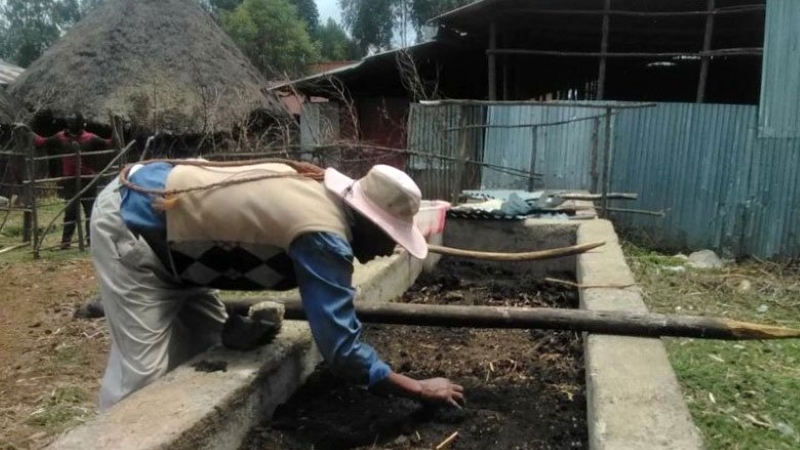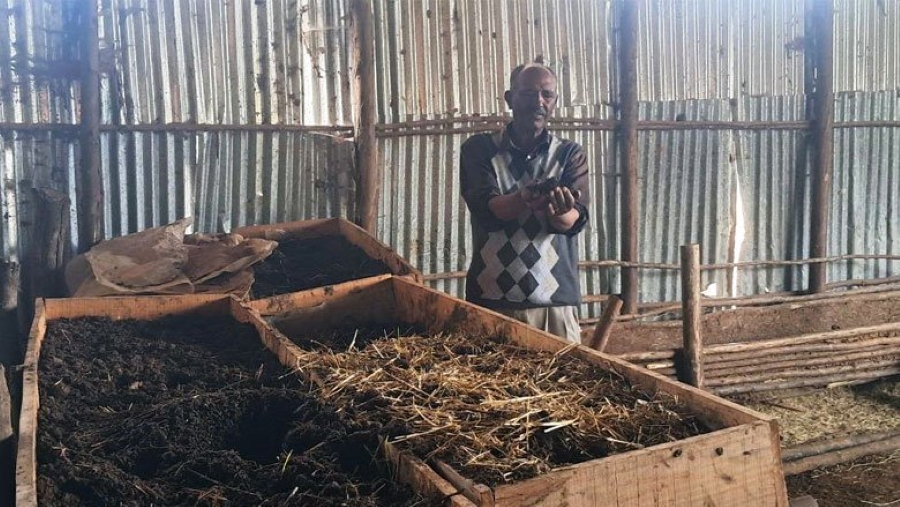Two years ago, Yohanis Tesfaye, a 56-year-old smallholder farmer from Jarso Bardada Kebele in Oromia, faced severe challenges.
Once fertile, his land had become difficult to cultivate due to years of unsustainable farming practices, heavy rainfall, and erosion.
Poor soil fertility and acidity, worsened by continuous use of chemical fertilizers, made it increasingly difficult for crops—especially maize, his family’s staple—to grow. As yields declined, food shortages and financial hardship took a toll on his household.
He continued using chemical fertilizers, but they failed to restore soil fertility. His maize yield kept declining, and providing for his family became more difficult with each passing season.
His are not isolated challenges.
Across Ethiopia, soil degradation poses a growing threat to food security and rural livelihoods.
Over 85 percent of the population of almost 129 million (2023) depends on agriculture, yet much of the country’s arable land is losing its productivity to erosion, nutrient depletion, and unsustainable land use.
Alarmingly, an estimated seven million hectares in Ethiopia are now acidic, rendering them less suitable for crops, unless treated.
This widespread decline in soil health undermines individual farmers’ incomes and national efforts towards food self-sufficiency and climate resilience.
As fertile land becomes scarcer, communities are pushed deeper into poverty, and the pressure on still productive areas intensifies, creating a vicious cycle.
For Tesfaye, everything began to change after he attended training sessions at his district agricultural office.
Led by experts trained through the Ethiopia Food Systems Resilience Program (FSRP), a World Bank-supported Ethiopian government initiative, these sessions introduced him to sustainable farming techniques.
He learned about integrated soil fertility management and vermicomposting, a process that uses earthworms to convert organic waste into nutrient-rich compost.
Tesfaye says he started to vermicomposting with his family’s help. “The program gave me a composting box and worms, and I agreed to build a composting house. Soon after, I was able to prepare compost and use it to grow maize.
The results were immediate.
Applying vermicompost—supplemented with 50 kg of inorganic fertilizer from the project—to his 0.25-hectare maize field, boosted his yield by 67 percent from 9 to 15 quintals in just one season.
This meant food and increased income for his family.
To date, the USD 680 million FSRP has reached 48,700 farmers with training on managing soil fertility, use of organic fertilizers, and integrated pest management.
Through hands-on demonstrations—such as lime application and pest control techniques—farmers like Tesfaye have been able to learn how to improve soil structure, nutrient availability, and crop health.

And in regions where the soil’s pH was critically low, lime and vermicomposting have helped neutralize acidity, making soil nutrients more accessible to plants.
Beyond this, 1.2 million people have benefited from a broader range of interventions.
These include capacity building on best practices and proven technologies, support for enterprise development, formation and strengthening of farmer groups, training in agribusiness and entrepreneurship, as well as improved access to irrigation, animal health services, and agricultural inputs.
The Ethiopia FSRP is part of a broader regional initiative, spanning seven Eastern and Southern African countries, aimed at strengthening food security, enhancing rural livelihoods, and building resilience to climate change.
Using knowledge-sharing across nations, it ensures each can tailor interventions to its specific needs while learning from the others’ successes.
The regional program focuses on five key areas: providing short-term crisis support, rebuilding agricultural capacities, promoting sustainable resource management, improving market access, and integrating food systems resilience into policy.
Agricultural experts, early warning specialists, policymakers, and development partners recently gathered in Addis to exchange information in person on best practices on digital agriculture, trade scorecards, and sanitary and phytosanitary standards, all aimed at enhancing food systems and regional trade.
Within Ethiopia, FSRP is improving agricultural extension services and digital agriculture by upgrading public systems and fostering public-private partnerships.
It offers specialized advice in mechanization, post-harvest management, urban agriculture, and climate-smart practices.
To deepen farmer education, FSRP is establishing knowledge hubs and upgrading training centers, providing hands-on learning that enables farmers like Tesfaye.
Yohanis is just one of many farmers who have transformed their livelihoods through this support. After adopting sustainable practices like vermicomposting and integrated pest management, he significantly increased his maize yields and improved the resilience of both his farm and his community.
“When my neighbouring farmers ask me about the benefits of compost, I explain it to them and encourage them to use it,” Tesfaye says, his story reflecting the program’s impact.

